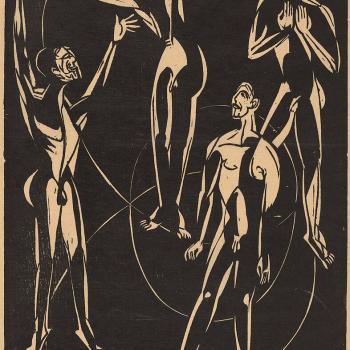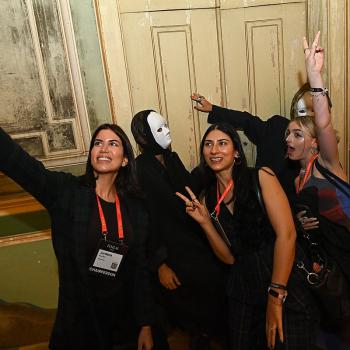
On September 12, 2016, I published a piece about Catholic Twitter’s most notorious catfish. I explored the way in which that little ecosystem’s then most popular account took us all (and most of all me) for a ride. Those days seem halcyon now—half the people I see posting these days probably don’t even know what I’m talking about. But back then it was a big deal. We’ve moved on.
Some recent goings-on led me to read the comments on that post. What’s most striking is the strong sense among many that the internet wasn’t real life, that somehow—whether I was a fool or a vigilante—that happening meant nothing in the scheme of things. Meeting people online was, per them, weird. Getting involved with people you’ve never met, they said, was weird. Most of all, sharing my intimate experience online made me both credulous and weird (fair enough). Down the line, however, it’s clear that thos
e people couldn’t have been more wrong (again with the exception of my being a naïve freak).
That wasn’t clear to me at the time. I just wanted to move on with my life—finish my PhD, get drinks with friends, start a family, to, as Tim Heidecker sang, “do whatever it is the brokenhearted do.” I didn’t care to forget so much as I figured that was in the past. The internet is just some out-there, right? Some place for cat pics and me gusta faces?
Five years on, nothing could be further from the truth. The internet is one of the main sites of cultural production and consumption for people of all ages. My Facebook, though now departed by most people my own age, is filled with posts from older folks who never seem to log off. Catholic Twitter (never mind the rest) has metastasized, transformed into a dozen different micro-communities: Left, Right, bookish, gay, liberal, clerical, thirst, trad, etc. Instagram, which I hardly use, is the fourth most popular social media platform, and seemingly the most popular among my age cohort. Half my friends get all their opinions from YouTube. Reddit, Pinterest, and TikTok are all more popular than Twitter. OnlyFans exists. The new age is here, and it looks less like Blade Runner and more like that scene in The Parallax View, in which Warren Beatty stares at a rapidly accelerating montage of smiling children, God and Country, Thor, bikini-clad babes, Mao, dead bodies, beheadings, and Pope John XXIII. The internet is as real as COVID, dysphoria, and Bang energy drinks.
That reality has meaning. Of course there’s the discussions of meme magic (or at least there were such discussions); we’ve got a plethora of think pieces on incels and the My Little Pony fandom. We hear about the epidemic of loneliness and about our record levels of anxiety and depression. But these are symptoms, the sneeze and cough generated by a rhinovirus, not the Ding-an-sich. The underlying phenomenon is the total digitalization of the human experience. Pre-COVID this was obvious, but less interesting; now we are all the nerd wearing Google Glass, watching our data rush into the huge maw of—well, somebody. That in itself is interesting—what are we now?
Our new reality has flattened our sense of interpersonal connection. Sure it generates guys who make jokes about bringing guns to the Joker premiere. Sure, it means that you’ll have at least one friend constantly hectoring you to try out teletherapy (have you considered Talkspace?). And sure, it means the prisoners I used to teach aren’t allowed phones, except to download meditation apps (how long, O Lord, must we endure?). But the real trick is in reproducing certain ideological ticks and rhetorical modes. When you spend a solid slice of your life online—whatever your politics—you start to think and talk like your confreres. There’s the liberal-mental-health inflected “I’m so sorry that happened to you” followed by a mixture of self-effacement, self-care advice, and “sincere concern.” There’s the TFW When No GF guy presentation of emotion as a series of carat points masked (sometimes two layers thick) with a well-worn meme, a code to the community and signal to the outsider to keep away, at risk of being mocked. There’s even the MAGA emphasis on, you know, CAPITALIZING all the IMPORTANT words in one or another SCREED. If geography determines our spoken dialect, our internet communities condition our modes of typing, which, in turn, become our ways of speaking.
And I’m so sorry for us that this must be the case. We implicitly learn these cues and triggers and immediately shut out or allow in others based on how they write. It’s like the mainstay of the old 80s comedy, the Yuppie encountering the burned-out stoner, realizing that, like, these cretins aren’t worth their time. The typical response is mockery, which, of course, is usually mockery coded in dialect: “y’all see this loser?” “>be sincere about American politics,” “you’re a joke.”
The language expresses a flattening of ideology too. I have MAGA friends whom I have trouble talking to these days, because I can feel their Twitter and Instagram feeds, the talking points fed to them by influencers, rushing straight out of their mouths and into the void. But it cuts the other way too. The liberal-Left battle over whether Biden’s immigrant detention center policy constituted a big no-no mostly consisted of MSNBC articles facing off with those from Jacobin. There is, after all, an economy at work here. We normal folks absorb, translate, and announce the ideology that comes down the pipeline, preparing for the epic rap battles that are Facebook post comment sections or Twitter threads. We have to stand up for our own—what’s the fun otherwise?
All the more with the younger generation. Communities are now formed online as much as in schools or whatever other “traditional space” people might imagine. More than once I have stumbled into a part of the internet that I simply could not comprehend. I’d link to the videos or posts I’m talking about, but they were so inscrutable I can’t even remember what they were called. Micro-celebrities rise and fall, splinter off into micro-micro communities that make the audience for Rocky Horror Picture Show in the Gulf States look like a first screening of a documentary about Saudi women at Sundance. All this in the shadow of the macro-groups, the influencers hawking wellness products to your cousin. It’s a small world after all.
The twisted bit is that this is the answer to the old conservative complaint levied in the famous Bowling Alone. The Elks died so the Xanax rapper phoenix could rise. People are simultaneously alienated, lonely, and shacked up online. These are the new communities—insular as ever, but more liable to brush up against each other on social media. Now we can see the idiotic thoughts of those we disagree with; we relish them, huffing the fumes of our own pre-packaged comebacks. We are constituted by our access to other people’s minds, and get to pat ourselves on the back for being so constituted.
Conservatives often wonder why we see so much stylistic, gender, sartorial, and content play these days, but the answer is simple—because now we become creatures of community much earlier and more intensely. As a kid, I picked up a mixed love and resentment of my locale, as I imagine most do. I loved my parents, but found them perplexing, and found their cultural tastes both embarrassing and influential. Now we can take cracks in our personalities, holes in our self-portrait, and solder them over with cultural goop (in some cases, quite literally). On the popular end, fast fashion as seen through TikTok clips offers a constant high to chase. The old nerd sat in his bedroom reading comic books or in the library checking out the newest military playthings. Now that nerd can find thousands with the same interests by age 10. And go down whatever paths these comrades propose—just like that. Conformity is easier than ever, even if it’s fractal.
I bother writing about this because it is the central question of our age: what is the new digital subject and how does it work? The Darwinian answer is endorphins, but I’ve never been much for that sort of easy solution. The psychological answer is alienation, but, again, we’re in effect territory when we want cause country. This stuff isn’t going away. The “it’s not real life” excuse, the “touch grass” excuse won’t be enough anymore. The search bar is the grass. The forum roleplays have human skin. The person on Twitter telling you not to use “lame” because it’s a slur is as real as your uncle sending you Q updates. It’s all real. We’re all real. The catfishing, well, that’s only just begun.













